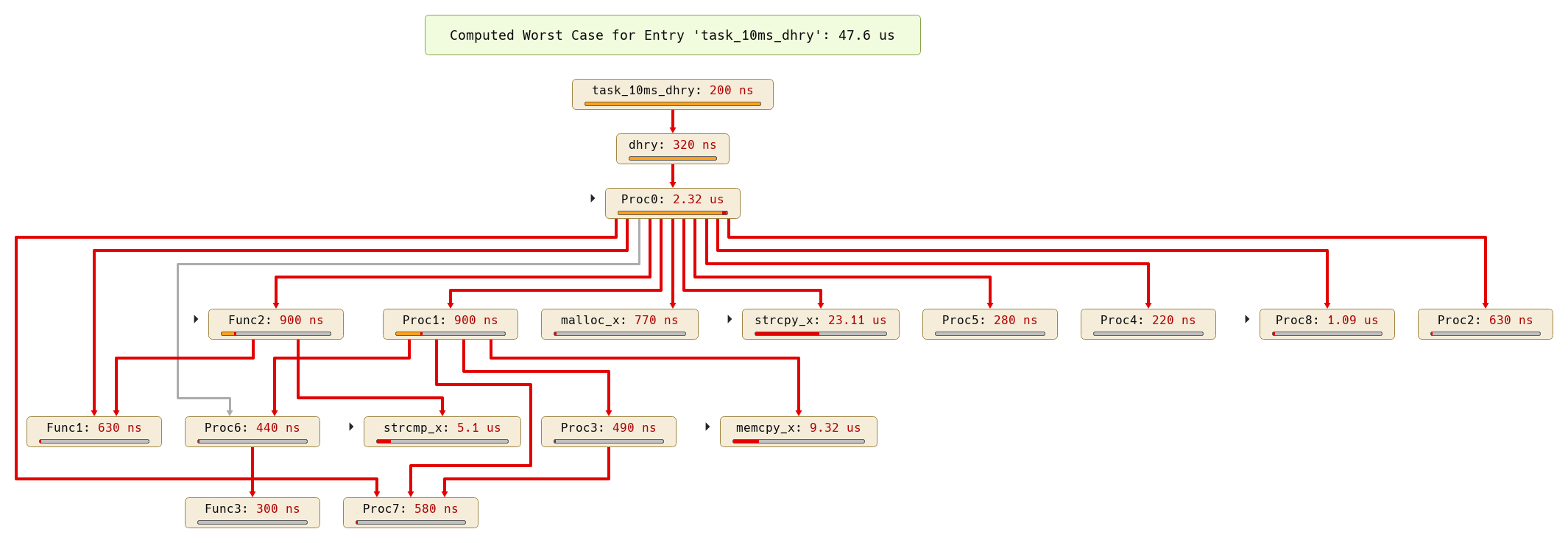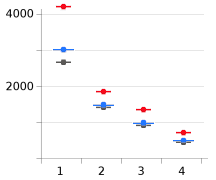aiT WCET Analyzer for ARM statically computes tight upper bounds for the worst-case execution time of tasks in safety-critical applications written or generated in C, C++ or Ada and compiled to run on ARM processors.

Your benefits
- The static analysis guarantees that the computed WCET bounds hold for all possible inputs, all possible cache and pipeline states, each task execution under any circumstances. No testing or measuring required.
- aiT directly analyzes binary executables, exactly as they are executed in the final system. It requires no modification of your system’s operational behavior or performance, and no modification of your toolchain.
- aiT-computed bounds are extremely tight and thus reflect the actual performance of your system. Deadline adherence is ensured without wasting hardware resources.
- aiT lets you easily save and compare the analysis results before and after making changes to your system, such that their effect on the worst-case timing can be understood immediately and completely.
- Using aiT is essential in meeting current safety standards such as ISO 26262, EN-50128, and DO-178B/C, where static WCET analysis is part of the architectural safety requirements.
Key features
- Fast analysis of complex real-world software
- Dead code recognition
- GUI and command-line mode
- Customizable XML reports
- Integration with TargetLink and Jenkins
- Qualification Support Kits
Supported processor derivates






- ARM7TDMI
- ARM720T (Sharp LH79520)
- ARM Cortex-M0 (STM32F0DISCOVERY)
- ARM Cortex-M1 (Milandr 1986VE1T)
- ARM Cortex-M3 (e.g. STM32F103xx)
- ARM Cortex-M4 (Infineon XMC4500)
- ARM Cortex-R4F (TI TMS570LS3137)
- ARM Cortex-R4F LCR
- ARM Cortex-R5F (TI TMS570LC4357)
The standard license covers one derivate of your choice. Additional derivates can be unlocked for a surcharge.
For Cortex-A53 or Cortex-M7, we recommend using TimeWeaver that combines static analysis with real-time instruction-level tracing. Likewise for Xilinx Zynq UltraScale+ implementations that offer an ETM tracing interface. This hybrid approach is compliant with CAST-32A and EASA AMC 20-193.
For other derivates not listed above, write to info@absint.com.
Timing profiling from day one
In order to provide WCET guarantees, aiT for ARM formally models the exact processor derivate your application is executed on.
If you are planning on using Cortex but haven’t picked a specific derivate yet — or if the final pick is not yours to make —, you can nonetheless benefit from static analysis to develop your application in a timing-conscious way, from day one.
For this, you can use the fully-integrated TimingProfiler. It will help you identify application parts that will cause unsatisfactory execution times regardless of the specific make of Cortex you end up using.
Once the hardware has been decided on, you can then easily switch from TimingProfiler to aiT, within the same GUI, keeping all your settings and annotations, and without having to install anything.
Also available for ARM
Supported compilers
- ARM Developer Suite C/C++ compiler
- The formally verified CompCert compiler
- GNU C/C++ compiler (GCC)
- Green Hills MULTI for ARM (C, C++ or Ada)
- IAR C/C++ compiler
- KEIL MDK-ARM C/C++ compiler suite
- HighTec LLVM
- Other LLVM/Clang-based ARM compilers
- Tasking C/C++ compiler
- Texas Instruments C/C++ compiler
- Wind River Diab C/C++ compiler
The standard license covers one compiler of your choice. Additional compilers can be unlocked for a surcharge.
Independent reviews
- aiT for ARM7:
- aiT for ARM Cortex-M4:
Recent improvements
- Improved automatic resolution of computed control-flow transitions
- Improved instruction-set detection using ARM EABI mapping symbols
- Improved decoding of the
MSRinstruction - Improved handling of several annotations
- Three additional qualification test cases
- See the complete release notes
- Improved handling of illegal opcodes during decoding
- Improved iterative decoding
- Improved automatic resolving of C++ virtual member function calls
- Improved handling of memory-access errors
- Several Clang-specific improvements
- Two additional qualification test cases
- See the complete release notes
- Improved precision for AArch64
LSL,LSR,ASR - Improved branch splitting precision
- Improved automatic decoding of computed control-flow transitions for Clang
- Improved switch-table decoding for TI 20.2.1 LTS
- Clarified analysis restrictions concerning mode switches
- Two additional qualification test cases
- See the complete release notes
- Analysis of dynamically linked ELF files
- Instruction support extended up to ARMv9.3, with certain exceptions listed in the user manual
- Improved switch-table decoding for Clang
- Ten additional qualification test cases
- See the complete release notes
- Improved switch-table decoding for Clang and DiabData
- TLS-encrypted network connections
- WCET analysis for STM32F103xx (Cortex-M3)
- Eight additional qualification test cases
- See the complete release notes
- Even faster cache and pipeline analysis
- Improved PC-relative switch-table decoding
- New switch-table pattern to heuristically guess the switch-table size
- The
UDFinstruction is now handled as a program end - Improved handling of invalid guarded code blocks for Thumb
- Two additional qualification test cases
- See the complete release notes
Qualification support

Your usage of aiT for ARM can be qualified according to ISO 26262, DO-178B/C, and other safety standards. We offer Qualification Support Kits that help you simplify and automate your qualification process:
- Board-specific base QSKs
- Optional compiler-specific add-on QSKs for
- GCC 4.7.4
- GCC 4.9.3
- KEIL 5.02.0.28
- TI 4.9.1
- TI 20.2.1.lts
Compiler-specific QSKs for other compilers can be developed on request.
System requirements
- Windows: 64-bit Windows 10 or 11
- Linux: 64-bit RHEL 9 or compatible
- 4 GB of RAM (16 GB recommended)
- 4 GB of disk space
- The Linux version requires the
libxcb-*family of libraries to be installed - Support for macOS is possible on request for a surcharge
Free trial
You can try aiT for free, on your own applications, for a period of 30 days. The free license covers:
- One supported ARM derivate of your choice
- Any number of supported compilers
- More than one physical machine if needed, but no VMs
- Windows, Linux, or both
- The ValueAnalyzer add-on, and also StackAnalyzer if you wish
- Free online training and tech support
